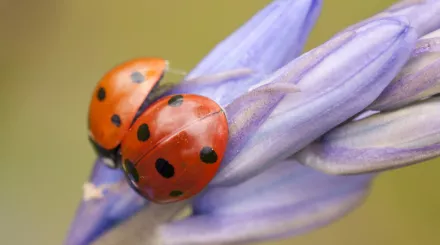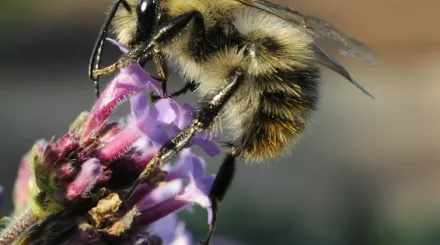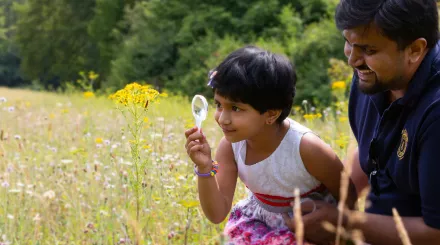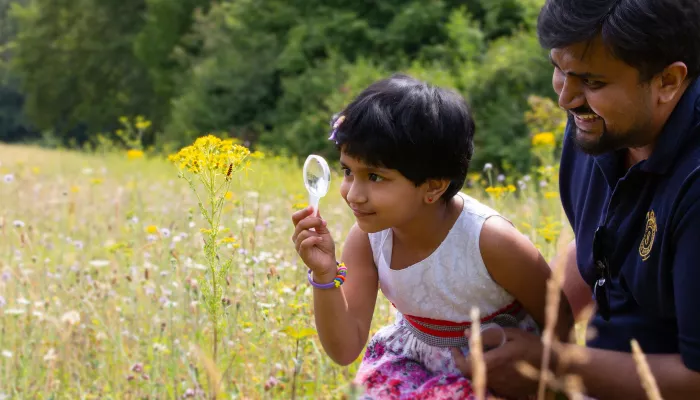Insects may be small but they make up the bulk of known species on earth. They are critical to the functioning of terrestrial and freshwater ecosystems, performing vital roles such as pollination, seed dispersal and nutrient cycling.
Insects are dying out up to 8 times faster than larger animals such as birds, bats, fish, amphibians and lizards and 41% of insect species face extinction, according to a report by Professor Dave Goulson commissioned for the South West Wildlife Trusts.
The Action for Insects campaign aims to combat the drastic declines in insect numbers which have far-reaching consequences for wildlife and people.
Read the report: Insect declines and why they matter

Insects face mass extinction

Why should we care?
Building a recovery network
The Wildlife Trusts around the United Kingdom are making sure to stop this decline and continue the work we do in building a Nature Recovery Network for Insects.
Through Projects like Wild about Gardens, Bugs Matter, Nature Recovery Network and Roadside Reserves we work together to address the causes of insect loss, halt and reverse them, and secure a sustainable future for insect life and for ourselves.

Take Action
Insects are vital to both the environment and economy of the Garden of England. In Kent we rely on pollinating insects for the prosperity of our agricultural, horticultural and fruit growing sectors. Therein lies one of the key conflicts this report highlights, the damage done to insect abundance by the use of agricultural and garden pesticides is a reflection of how disconnected we have become from the nature we rely on. Many of us will remember the clouds of insects we used to see caught in our headlights, and our Bugs Matter monitoring programme which measures bugs on car bumpers, is one project which highlights the dramatic losses we have seen over the past decades.Paul Hadaway, Director of Conservation at Kent Wildlife Trust
The rate at which insects have declined in the past 20 years is something which should not only shock but also motivate us all to take action. Kent Wildlife Trust can help you be part of the solution, whether advising on making our own gardens more insect friendly, supporting organic approaches to growing our food, improving our road verges and urban spaces for wildlife generally and insects in particular, there are multiple ways we can make a difference. The time to do this has never been more pressing and the role of organisations like Kent Wildlife Trust, our members and the communities we work with across Kent never more vital.
Tell me more
In many parts of Britain, traditional family farms have given way to large agri-businesses, typified by large fields, often managed by external contractors, maintained as near perfect monocultures by high inputs of pesticides and fertilizers.
The result is a landscape that produces more food, more cheaply, than it used to, but is largely inhospitable to wildlife and provides employment for very few people. The low price of food on the supermarket shelves that we have become used to does not reflect the true environmental costs of its production. It is also important to note that farmers only receive a fraction of the retail sale price of food, so the cost of improved on-farm practice would have a relatively small impact on shoppers.
Recent studies from France estimate that total pesticide use can be reduced by 42% without significant reductions to yield or profit
France is one of the biggest consumers of pesticides in Europe (per unit of agricultural area). In 2013, after controversy over levels of pesticide concentration in drinking water, the French government set a target of a 50% decrease in pesticide use, promoting the principles of agroecology and advocating integrated management of pests for a reduction of pesticide reliance.
Food security and economic impacts were a major consideration for policy advisors and researchers:
“We demonstrated that low pesticide use rarely decreases productivity and profitability in arable farms. We analysed the potential conflicts between pesticide use and productivity or profitability with data from 946 non-organic arable commercial farms showing contrasting levels of pesticide use and covering a wide range of production situations in France. We failed to detect any conflict between low pesticide use and both high productivity and high profitability in 77% of the farms.” Lechenet et al. 2017
Gardening without chemicals is a good way to ensure that the food and plants you grow are free of pesticides or chemicals, thriving without the extra expense of dangerous products that are harmful to our wildlife. If you’ve used chemicals in the past, this might sound like an invitation to every pest for miles around to shred your garden ... and that might well happen at first. But, with time and patience, you’ll end up with a rewarding, healthier garden for ditching the chemicals.
Spraying to deal with pests can often kill the predators too, or at least make them want to avoid your garden. When you stop using chemicals, aphids are the first creatures to return as they have a short breeding cycle. Their predators may take longer to come back, but stick with it and know it will be better in the long run!
In the end you’ll wonder why you ever needed chemicals in the first place.
We can turn our cities, towns, villages and gardens into a buzzing network of insect-friendly habitats. We have about ½ million hectares of gardens in the UK, plus city parks and green spaces, school playing fields, railway embankments and cuttings, road verges and roundabouts; if managed favourably, and if we avoid pesticide use these areas could go a long way towards creating a national ‘Nature Recovery Network’.
250,000 miles of road verges. More could be managed for wildlife by sowing insect friendly seed mixes, mowing later in the year, and removing the cuttings. Green bridges should be a part of transport infrastructure projects.
430,000 hectares of gardens. Wildflowers in gardens have huge potential to help pollinators such as bees. A network of small patches could help bees thrive in urban areas.
52 million people. 80% of the UK’s population live in urban areas. New parks, street trees, green roofs and walls are an important way to help everyone experience nature in daily life.
Our public spaces. Two thirds of amenity land is short mown grass, but meadow habitats support eight times more wildlife. Just allowing more flower species in the grass, and mowing some areas less frequently has been shown to be of huge benefit to insects. Greener and more biodiverse neighbourhoods provide health and wellbeing benefits for people.
Our farmland. 70% of UK land is farmland, so making our farms more wildlife friendly and sustainable is vital.
The Wildlife Trusts and our Greener UK partners are campaigning for UK Government to pass new laws that will not only protect but will also help to restore green spaces and wild places.
We want a Nature Recovery Network enshrined in law to:
- protect existing wildlife sites and map out where wildlife ought to be, joining up important places for wildlife, while ensuring more people can live closer to nature
- Set targets for environmental improvement and nature’s recovery;
- Require plans to be produced to integrate national and local regulation, spending, investment and action.
You can find out more about our Wilder Kent campaign here.

